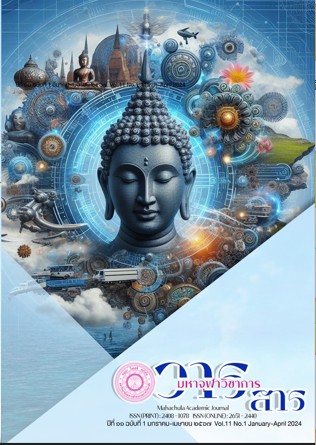Effectiveness of Digital Financial Transactions Affecting the Acceptance of Cashless Society of Tourism Businesses
Main Article Content
Abstract
The purpose of this research is to study the effectiveness of digital financial transactions from perceived benefits from behavioral use and from perceived benefits from intended use that affect acceptance in a cashless society of the tourism business. It is quantitative research. A questionnaire was used as a research tool to collect data from a sample group of 405 people living in Bangkok and Perimeter. A probability sampling method was used, by Simple Random Sampling, Data analysis used multiple regression analysis.
The results showed that effectiveness of digital financial transactions from perceived benefits from behavior based on (1) ordering products through online networks (2) using QR code systems for payments (3) using Credit or debit cards instead of cash (4) Using Electronic Banking (5) Using various applications on mobile phones or electronic media, and the effectiveness of digital financial transactions from the perceived benefits of use as objective, which includes (1) The convenience of using money anywhere, anytime (2) The ease and time saving of (3) Risks arising from currency exchange rates (4) Safety from digital financial transactions (5) The reliability of digital financial transactions processes affects business acceptance in a cashless society. Tourism in Bangkok and Perimeter in terms of technology, social and legal aspects are statistically significant at the .05 level.
Article Details

This work is licensed under a Creative Commons Attribution-NonCommercial-NoDerivatives 4.0 International License.
References
กุลนาถ ภัททานุวัตร์ และ ระพีพร ศรีจำปา. “ปัจจัยที่มีผลต่อความตั้งใจใช้ระบบชําระเงิน QR code ในการก้าวสู่สังคมไร้เงินสด กรณีศึกษาธนาคารพาณิชย์ในประเทศไทย”. รายงานการประชุม Graduate School Conference. ปีที่ ๑ ฉบับที่ ๑ (มิถุนายน ๒๕๖๑) : ๑๗๒-๑๑๒.
ชนิลทร ชูรัตน์. “พฤติกรรมและความพึงพอใจในการใช้ชีวิตแบบสังคมไร้เงินสดของพนักงานบริษัทในอำเภอหาดใหญ่ จังหวัดสงขลา”. ค้นค้าอิสระคณะบริหารธุรกิจ. สาขาวิทยบริการเฉลิมพระเกียรติจังหวัดสงขลา: มหาวิทยาลัยรามคำแหง, ๒๕๖๑.
ชลิตพันธ์ บุญมีสุวรรณ. “สังคมไร้เงินสด.” วารสารธุรกิจปริทัศน์. ปีที่ ๑๐ ฉบับที่ ๒ (กรกฎาคม-ธันวาคม ๒๕๖๑) : ๒๓๕-๒๔๘.
ชุมแพร บุญยืน นวรัตน์ เดชพิมล ณุกานดา ศุภวัฒน์ และศิรินนา วอนเก่าน้อย. “ทฤษฎีการยอมรับการใช้เทคโนโลยีสารสนเทศ”. วารสารช่อพะยอม. ปีที่ ๒๙ ฉบับที่ ๑ (มกราคม-พฤษภาคม ๒๕๖๑) : ๓๕๙-๓๗๑.
ทัศน์ทยา ธรรมวนิช. “ทัศนคติเกี่ยวกับการเตรียมความพร้อมของสงัคมไร้เงินสดของประชาชน จังหวัดนครศรีธรรมราช”. วิทยานิพนธ์บริหารธุรกิจมหาบัณฑิต. คณะบริหารธุรกิจ: มหาวิทยาลัยรามคำแหง, ๒๕๖๒.
นันทนี ลักษมีการค้า. "ปัจจัยการยอมรับเทคโนโลยีต่อการเข้าสู่สังคมไร้เงินสดของประชากรเจเนอเรชั่น เอ็กซ์ขึ้นไป : กรณีศึกษาจังหวัดกรุงเทพมหานคร”. การค้นคว้าอิสระหลักสูตรบริหารธุรกิจมหาบัณฑิต. คณะพาณิชยศาสตร์และการบัญชี: มหาวิทยาลัยธรรมศาสตร์, ๒๕๖๒.
นงนุช หอมบุญ นภัทร พงษ์ประนิธิ และ พรพนา ศรีสถานนท์. “การยอมรับและทัศนคติในการเข้าสู่สังคมไร้เงินสดของผู้บริโภคในเขตกรุงเทพมหานคร”. Journal of Arts Management. Vol. 4 No. 2. (พฤษภาคม-สิงหาคม ๒๕๖๓) : ๔๘๙-๕๐๒.
มัทยา ศรีพนา. “สถานการณ์สังคมไร้เงินสดของประเทศไทย วิทยากรชำนาญการสำนักวิชาการ. สำนักงานเลขาธิการวุฒิสภา. บทความวิชาการ”. ปีที่ ๙ ฉบับที่ ๑๓ (กุมภาพันธ์ ๒๕๖๔) : ๑-๕.
รัฐนนท์ วรทัต และ วศิน ชูประยูร. “การศึกษาเชิงประจักษ์ปัจจัยที่ส่งผลต่อการยอมรับและใช้ระบบคิวอาร์โค้ดเพย์เมนต์ของผู้บริโภคกลุ่มเจเนอเรชั่นวาย”. รังสิตสารสนเทศ. ปีที่ ๒๔ ฉบับที่ ๒ (กรกฎาคม-ธันวาคม ๒๕๖๑) : ๒๔-๕๑.
สุธาทิพย์ นิธิสิริพงศ์ และ มฑุปายาส ทองมาก. “ปัจจัยที่ส่งผลต่อความตั้งใจในการใช้แอพสแกนรหัสคิวอาร์ซื้อสินค้าจากร้านค้าเสมือน”. วารสารจุฬาลงกรณ์ธุรกิจปริทัศน์. ปีที่ ๓๙ เล่มที่ ๑๕๒ (เมษายน-มิถุนายน ๒๕๖๐) : ๙๐-๑๒๑.
สมชาย เลิศวิเศษธีรกุล บดินทร์ รัศมีเทศ และ กมลพรรณ แสงมหาชัย. “ปัจจัยที่ส่งผลต่อความพร้อมเข้าสู่สังคมไร้เงินสดของประชาชนในกรุงเทพมหานคร”. การประชุมทางวิชาการของมหาวิทยาลัยเกษตรศาสตร์ ครั้งที่ ๕๗. สาขาเศรษฐศาสตร์และบริหารธุรกิจ: มหาวิทยาลัยเกษตรศาสตร์. วันที่ ๒๙ มกราคม - ๑ กุมภาพันธ์ ๒๕๖๒.
อรรณพ ดวงมณี และ ต่อตระกูล อุบลวัตร. “พฤติกรรมการใช้สื่อใหม่ และทัศนคติที่มีต่อการเข้าสู่สังคมไร้เงินสดของประชาชนในกรุงเทพมหานคร”. วารสารนิเทศสยามปริทัศน์. ปีที่ ๑๗ ฉบับที่ ๒๒ (มกราคม-มิถุนายน ๒๕๖๐): ๕๐-๑๖๒.
อัจฉราวรรณ สุขเกิด และอาภา ไสยสมบัติ. “การศึกษาทัศนคติและพฤติกรรมการใช้บริการธุรกรรมทางการเงินด้วย Cashless ของนักศึกษาคณะวิทยาการจัดการ มหาวิทยาลัยราชภัฎวไลยอลงกรณ์ ในพระบรมราชูปถัมภ์”. วารสารวิทยาการจัดการปริทัศน์. ปีที่ ๒๓ ฉบับที่ ๑ (มกราคม-มิถุนายน ๒๕๖๔) : ๑๒๕-๑๓๖.
Zhao Z & Balague C. “Designing branded mobile apps: Fundamentals and recommendations”. Business Horizons. Vol. 58 No. 3. (May-June 2015) : 305-315.


